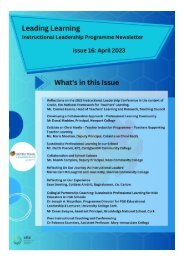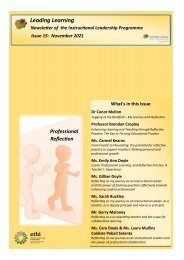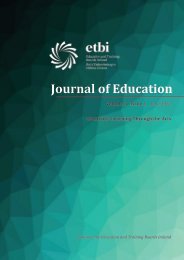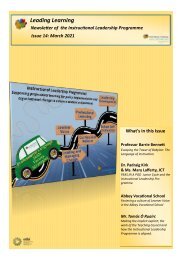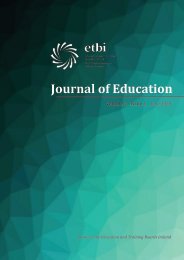ETBI Journal of Education - Vol 2:2 November 2020 (Irish-medium Education)
This bilingual edition of the Journal of Education celebrates Irish-medium Education
This bilingual edition of the Journal of Education celebrates Irish-medium Education
You also want an ePaper? Increase the reach of your titles
YUMPU automatically turns print PDFs into web optimized ePapers that Google loves.
<strong>ETBI</strong> <strong>Journal</strong> <strong>of</strong> <strong>Education</strong> <strong>November</strong> <strong>2020</strong><br />
Language Planning and <strong>Irish</strong> Acquisition in<br />
the <strong>Education</strong> System<br />
Dr. Victor Bayda South Kerry, Joint Gaeltacht Committee<br />
OUTLINE<br />
The acquisition <strong>of</strong> <strong>Irish</strong> in the context <strong>of</strong> the<br />
education system is <strong>of</strong> great importance to<br />
Category C Gaeltacht regions and to non-Gaeltacht<br />
regions. For the achievement <strong>of</strong> this aim, a<br />
complete change in approach is needed in terms<br />
<strong>of</strong> supports, in order to enable people to use <strong>Irish</strong><br />
outside <strong>of</strong> the school setting. The main outcome<br />
<strong>of</strong> the teaching method currently employed for<br />
<strong>Irish</strong> is the reinforcement <strong>of</strong> the idea that the<br />
language is simply a school subject, which creates<br />
huge obstacles for progress and normalisation <strong>of</strong><br />
the language. Sentiment must be created amongst<br />
students that their <strong>Irish</strong> language sessions are<br />
enjoyable activity breaks, as opposed to simply<br />
classes, and to create an experience <strong>of</strong> language<br />
companionship/fellowship, realistic language<br />
environment and language parents.<br />
DR VICTOR BAYDA<br />
I graduated from the School <strong>of</strong> Philology at<br />
Moscow State University in 2014. I defended<br />
my PhD dissertation in 2009 and worked as a<br />
lecturer in <strong>Irish</strong> in the same university until 2019,<br />
when I was appointed Language Planning Officer<br />
for South Kerry.<br />
The language planning process began with the<br />
Gaeltacht Act 2012, which placed Ireland at the<br />
forefront <strong>of</strong> the novel field <strong>of</strong> language planning.<br />
IT IS IMPORTANT THAT A<br />
LANGUAGE BE CLOSE TO ONE’S<br />
HEART FROM A VERY YOUNG AGE<br />
IF WE WANT THAT LANGUAGE TO<br />
HOLD VALUE FOR THAT PERSON.<br />
Under the Act, the Gaeltacht was divided into<br />
26 language planning areas and for each LPA a<br />
language plan was to be devised and a language<br />
planning <strong>of</strong>ficer appointed.<br />
I was appointed as language planning <strong>of</strong>ficer in<br />
Uíbh Ráthach in 2019 and I have been working<br />
on the implementation <strong>of</strong> the South Kerry<br />
Language Plan ever since. South Kerry is a<br />
“Category C Gaeltacht Area” (Ó Giollagáin and<br />
Mac Donnacha et al. 2007), which means that less<br />
than 44% <strong>of</strong> the population are daily speakers.<br />
Indeed, according to the 2016 Census, only 121<br />
people, that is 7% <strong>of</strong> the population <strong>of</strong> the Uíbh<br />
Ráthach Gaeltacht, claim to be daily speakers, and<br />
although more than half <strong>of</strong> the local population<br />
claimed that they can speak <strong>Irish</strong>, it is clear that<br />
the language has receded in the area and is no<br />
longer the community language.<br />
As a result, the South Kerry Language Plan<br />
emphasizes language revitalisation, and without<br />
PAGE 143




